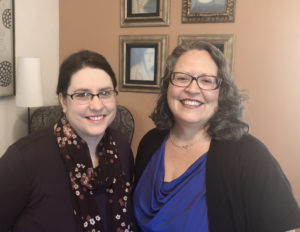Allegheny Professors Receive Grant to Integrate the Humanities and Sciences
Two Allegheny College professors have been awarded $35,000 from the National Endowment for the Humanities (NEH) to plan for interdisciplinary partnerships between the natural sciences and the humanities and to extend the impact of the humanities both in and out of the classroom.
Associate Professor of English M. Soledad Caballero, project director, and Associate Professor of Psychology Aimee Knupsky, co-project director, will use the funding to apply “ethical interdisciplinarity at Allegheny College to enhance the impact of the humanities” so “scholars learn with one another rather than learn about each other in isolation.”
“To solve problems like climate change or the health-care crisis, we need to do more than read a book or test a sample,” said Knupsky. “We need to be able to do both and to talk to one another in the process. We’d like to see a return to the ‘age of wonder’ when writers, scientists and scholars collaborated without boundaries, leading to some of the most innovative advances of the modern world.”
The professors already have formed an academic planning committee of 13 staff and faculty members at the college. The group’s goal will be to develop plans for courses that intentionally connect the sciences and the humanities; investigate the influence of the humanities in existing interdisciplinary programs; expand the humanities in experiential learning environments; incorporate the humanities into Allegheny’s model of adaptive advising; establish protocol for interdisciplinary and collaborative senior capstone projects; and develop interdisciplinary research and teaching teams.
“The Planning Committee will host opportunities for faculty, staff and students to learn about and contribute to the ideas being considered for the application of ethical interdisciplinarity,” said Caballero. “These may include reading groups, lunchtime workshops, and meet-and-greets to provide faculty and staff the chance to find collaborative partners.”
“The committee also will pursue a campus-wide survey regarding perceptions of interdisciplinarity,” said Knupsky. “We will track the number of faculty, staff and students at outreach events. Then the committee will write a planning document that provides a foundation for pursuing an implementation grant and invite feedback on it from the broader community.”
The NEH in April awarded $18.6 million in grants to 199 humanities projects across the nation. The grants will support projects such as advanced scholarly research, the documentation of endangered languages, humanities programs for service veterans, and the preservation of historic collections.
Created in 1965 as an independent federal agency, the NEH supports research and learning in history, literature, philosophy and other areas of the humanities by funding selected, peer-reviewed proposals from around the country. Additional information about the NEH grant programs can be found at www.neh.gov.